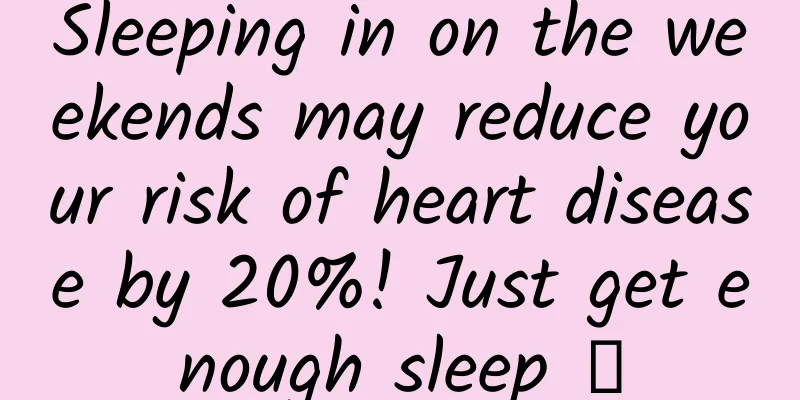Sleeping in on the weekends may reduce your risk of heart disease by 20%! Just get enough sleep →

|
Compiled by: Gong Zixin Can you really make up for all the late nights you stay up late during the week on weekends? Does it affect your heart health? Recently, the official website of the European Society of Cardiology (ESC) announced a new study conducted by Chinese scientists in 2024: People who "catch up on sleep" by sleeping in on weekends may reduce their risk of heart disease by 20%. "Adequate compensatory sleep is associated with a lower risk of heart disease," said researchers from the National Center for Cardiovascular Disease, Fuwai Hospital, Chinese Academy of Medical Sciences. "This association was more pronounced in people who were frequently sleep deprived on weekdays." It’s well known that sleep-deprived people will sleep in on their days off to mitigate the effects of sleep deprivation. However, research is lacking on whether this compensatory sleep is beneficial for heart health. The researchers used data from 90,903 subjects in the UK Biobank project. To assess the relationship between compensatory sleep on weekends and heart disease, sleep data were recorded using an accelerometer and grouped into quartiles (four roughly equal groups based on the most to least compensatory sleep): Group 1 had the least compensatory sleep, ranging from -16.05 hours to -0.26 hours (i.e. less sleep); Group 2 had -0.26 to +0.45 hours; Group 3 had +0.45 to +1.28 hours, and Group 4 had the most compensatory sleep (1.28 to 16.06 hours). Insufficient sleep was self-reported by the participants, and those who slept less than 7 hours per night were defined as insufficient sleep, with a total of 19,816 (21.8%) participants having insufficient sleep. The remaining study subjects may occasionally be insufficiently sleepy, but on average, their daily sleep duration did not meet the criteria for insufficient sleep. The researchers also collected information from participants' hospitalization records and cause-of-death registries for various heart disease diagnoses, including ischemic heart disease (IHD), heart failure (HF), atrial fibrillation (AF), and stroke. After a median follow-up of nearly 14 years, participants who had the most compensatory sleep were 19% less likely to develop heart disease than those who had the least compensatory sleep. In the subgroup with insufficient daily sleep, participants who had the most compensatory sleep had a 20% lower risk of heart disease than those who had the least compensatory sleep. The study analysis showed no differences between men and women. "Our results suggest that for a large proportion of the modern population who suffer from sleep deprivation, those who catch up the most sleep on weekends have significantly lower odds of heart disease than those who catch up the least," the researchers noted. The cover image and images within this article are from the copyright gallery (or copyright holder). Any reproduction or use may lead to copyright disputes. |
>>: Can't stop eating melon seeds? Your melon seed addiction is not entirely your fault!
Recommend
What are the side effects of eating oyster grass?
Oyster grass can be said to be a medicine, or a h...
How the Green Giant of Carbon Storage Can Resist an Unstable Climate System
Recently, my country has been affected by strong ...
The efficacy and function of narrow-leaved pepper
Narrow-leaved Piper melongena has a long history,...
Why are more and more strong typhoons coming earlier?
A strong typhoon is a tropical cyclone with great...
What are the medicinal values of castor seeds?
Castor seeds are a kind of herb produced in the s...
Monkeypox is transmitted between humans, and humans transmit COVID-19 to minks... Beware of the "virus interweaving" between animals and humans
The new coronavirus has not yet subsided, and mon...
The efficacy and function of white stem scorzonera
Only when we understand the main ingredients of a...
What happens when you press this small button in the subway car?
Addendum 1: Another little piece of knowledge for...
What are the effects and functions of potassium nitrate?
There is another name for sodium sulfate, which i...
What are the benefits of eating maca?
There are many benefits of eating maca. As a plan...
When you participate in a multi-person video conference, you are the only real person! How to prevent AI fraud?
Audit expert: Liu Xiangquan Director of the Robot...
How to fall in love with work again after returning from the New Year?
When you return to work after the holiday, Still ...
The efficacy and function of Spathiphyllum
Do you know White Crane Vine? It is a common Chin...
The efficacy and function of Vitex quinata stem
As a traditional Chinese medicine, Vitex quinata ...
Chinese seeds can come in handy at critical moments!
Corn can also be infected with infectious disease...









